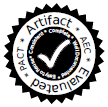Tweets about reusable R&D
Supporters


If you would like to sponsor this community service including prizes for highest ranked artifacts and supporting open-source technology for collaborative, customizable and reproducible experimentation, please get in touch with the AE steering committee!


If you would like to sponsor this community service including prizes for highest ranked artifacts and supporting open-source technology for collaborative, customizable and reproducible experimentation, please get in touch with the AE steering committee!
| Paper decision: | |
| Artifact submission: | |
| Technical clarification: | |
| Decision announced: | |
| Final paper: | |
| AE award: |
PACT AE Chairs:
Zheng Wang (Lancaster University, UK)
Hugh Leather (University of Edinburgh, UK)
AE SC:
Grigori Fursin, Bruce Childers

|
Artifact Evaluation for PACT 2016 |
Artifact evaluation is finished - see accepted artifacts here !
Authors of accepted PACT 2016 papers are invited to formally submit their supporting materials to the Artifact Evaluation process. The Artifact Evaluation process is run by a separate committee whose task is to reproduce (at least some) experiments and assess how the artifacts support the work described in the papers. This submission is voluntary and will not influence the final decision regarding the papers.
Papers that successfully go through the Artifact Evaluation process will receive a seal of approval printed on the papers themselves. Authors of such papers will have an option to include their Artifact Appendix to the final paper (up to 2 pages). Authors are also encouraged (though not obliged) to make these materials publicly available upon publication of the proceedings, by including them as "source materials" in the Digital Library. The authors of the highest ranked artifact will also receive a special prize!
If you have any questions, please check AE FAQs and do not hesitate to contact AE chairs!